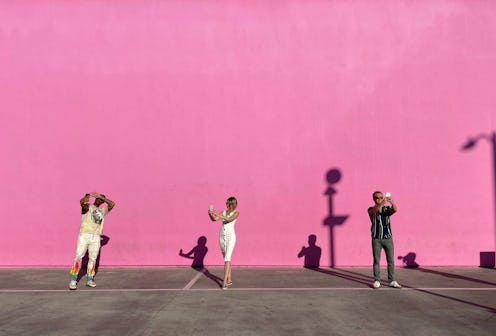Self
What Happens In Your Brain When You Gain Followers Online
"These superficial metrics can really play into one's perception of what we see online."

Instagram has many joys — cat videos, for one — and some people count growing their social network among them. Seeing your follower count tick upwards is proof positive that no one, no one!, can resist your pun- and AOC-fangirl-based personal brand. When your Insta followers increase, your brain reacts in particular ways — some pleasurable, some a little dangerous.
Gaining followers on Instagram can be a dopamine hit to your brain, neuropsychologist Dr. Sanam Hafeez Ph.D. tells Bustle. "This is a chemical associated with pleasure," she says. As a neurotransmitter, dopamine can make you feel happiness and a even little high. Dr. Hafeez adds that it can be particularly triggered by comparative behavior, where you compare your follower count to others who post similar content. "How many [followers] any poster will get is not predictable, so it adds a thrill-of-the-chase aspect that keeps it exciting," she says.
It can also produce other feelings, though. Psychotherapist Elizabeth Beecroft LCSW, a provider with mental health platform Alma, tells Bustle that if you're prone to monitoring your follower count, you could be fueling anxiety. "Having an uptick in Instagram followers can create a lot of pressure for the individual to perform or maintain," she says. "A large following can mean that you have more eyes watching or viewing your account, which can create symptoms of anxiety around wanting to keep that status, posting content that your audience enjoys, or even becoming too invested in your account's engagement." The pandemic may have also made this worse; a study in Frontiers in Psychiatry found that Italian adults used social media more during lockdown, and it also increased their anxiety levels.
Importantly, follower and like counts fluctuate, so tying your self-worth or feelings of happiness to those numbers can be a mental health risk. "Instagram uses algorithms, and some users are more adept at using hashtags and more alluring images than others," Dr. Hafeez says. Even if you're the same user bearing the same attributes, the amount of followers you gain may change from day to day. Because dopamine is part of the brain's reward pathway and is believed to play a role in addictive behaviors, if your follower count goes down or doesn't change, the lack of dopamine may make you feel miserable. "A day without this external reinforcement can bring about depression and feelings of lower self-worth," she says.
Followers on other accounts also have a psychological impact. "As a viewer, one might feel that because an individual has a large following, it might make them more credible," Beecroft says. "These superficial metrics can really play into one's perception of what we see online." Seeing a person has 1 million followers may make you view them as more reliable, or more popular than you. A study published in Child Development in 2018 found that college students were more likely to like Insta posts that had already received many likes from thousands of followers, and that popularity on the app activated the brain's reward circuitry.
If you're finding it difficult to stop refreshing your Insta page to see your follower status, or feel a pang of anxiety about the thought of maintaining your follower count, Beecroft advises taking a step back. "It's important to keep in mind that there are authentic ways to grow an audience, and then there are other ways, such as buying followers or paying for growth services," she says. When some people game the system, you might want to rethink if follower counts are some all-important metric. Dr. Hafeez also recommends chatting to a therapist or mental health professional if necessary, if you're finding it's sparking intense anxiety, worry, or feelings of emptiness.
The real lesson here? Followers may come and go, but puns about cats are fur-ever.
Experts:
Elizabeth Beecroft LCSW
Dr. Sanam Hafeez Psy.D.
Studies cited:
Boursier, V., Gioia, F., Musetti, A., & Schimmenti, A. (2020). Facing Loneliness and Anxiety During the COVID-19 Isolation: The Role of Excessive Social Media Use in a Sample of Italian Adults. Frontiers in psychiatry, 11, 586222. https://doi.org/10.3389/fpsyt.2020.586222
Sherman, L. E., Greenfield, P. M., Hernandez, L. M., & Dapretto, M. (2018). Peer Influence Via Instagram: Effects on Brain and Behavior in Adolescence and Young Adulthood. Child development, 89(1), 37–47. https://doi.org/10.1111/cdev.12838
Volkow, N.D., Wang, G-J., Fowler, J.S., Tomasi, D., & Telang, F. (2011) Addiction: Beyond dopamine reward circuitry. Proceedings of the National Academy of Sciences, 108 (37) 15037-15042; DOI: 10.1073/pnas.1010654108